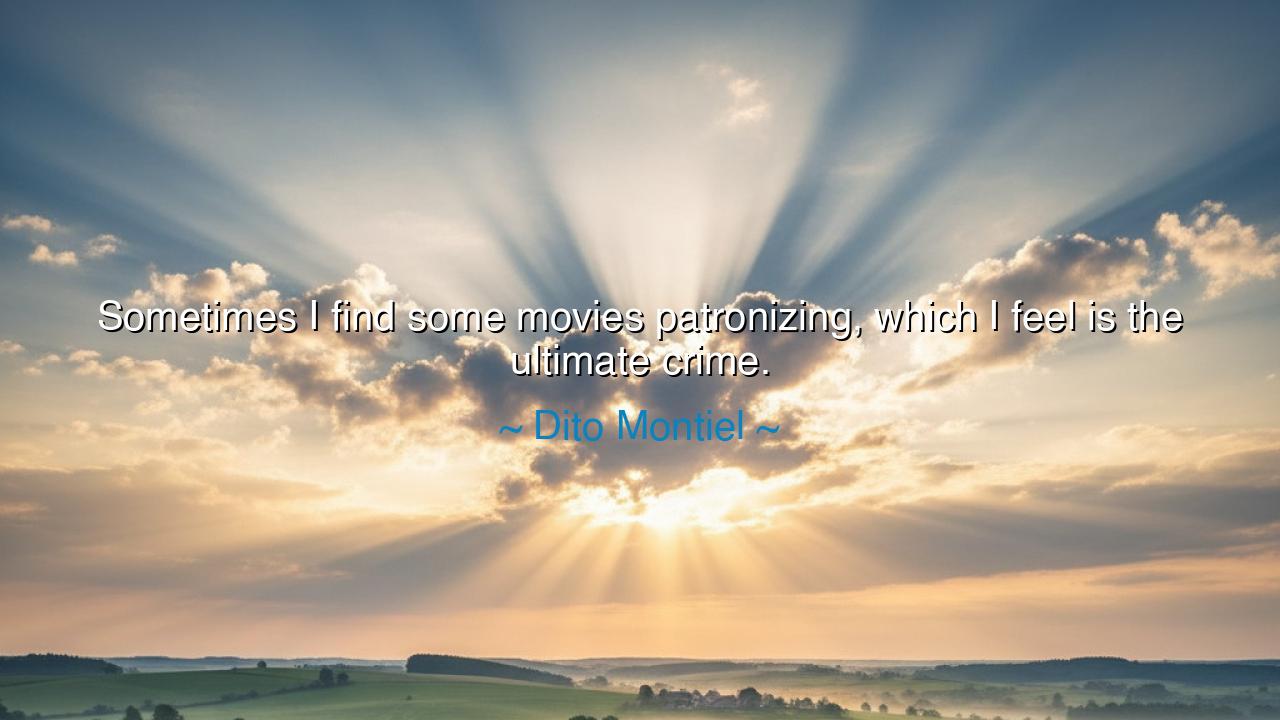
Sometimes I find some movies patronizing, which I feel is the






Dito Montiel’s words, "Sometimes I find some movies patronizing, which I feel is the ultimate crime," speak to a profound truth about the role of art—specifically film—in how it should engage with the audience. Montiel’s assertion that patronization is the "ultimate crime" in movies is a rebuke of storytelling that seeks to dumb down the audience, that treats them not as equals but as those in need of constant explanation and simplification. A patronizing film undermines the audience’s intelligence and dignity, forcing them to passively accept a version of reality that is pre-packaged, condescending, and ultimately unfulfilling.
In the ancient world, great stories were never intended to treat the audience as inferior. Homer’s epics, the Iliad and the Odyssey, were meant to challenge and inspire the listeners. They were full of complex characters, human struggles, and moral ambiguity, asking the audience to reflect on their own lives, their own choices, and the nature of heroism and fate. The stories were shared not to patronize, but to engage the audience in a dialogue, to ask them to ponder the deeper meanings of life. The Greek tragedies performed in the theaters of Athens were not designed to spoon-feed answers but to compel the audience to confront their own humanity and to grapple with the moral dilemmas presented on stage. In this way, these ancient stories held respect for the audience’s intelligence and ability to engage with the complexities of the human experience.
Even the great philosophers of the past, such as Socrates, approached teaching with the understanding that his students had the capacity for deep thought. Socrates’ famous method of questioning—the Socratic method—was not about telling others what they should think, but about guiding them to arrive at conclusions on their own, respecting their ability to reason. It was a practice of respectful engagement, not patronization. To tell someone how to think, without allowing them the space to come to their own understanding, was to treat them as lesser beings, incapable of their own intellectual journey. This respect for others' minds and abilities is a quality that modern cinema sometimes loses when it becomes overly simplistic, leaving the audience no room to reflect, to question, or to grow from the experience.
Consider the story of Alexander the Great, a ruler whose genius lay not just in his ability to conquer, but in his ability to unite diverse peoples through respectful leadership. Though he was a conqueror, Alexander understood that true leadership required acknowledging the value and wisdom of others, regardless of their origin. When he encountered the Egyptians, for example, he did not treat them as inferior subjects but respected their ancient culture, incorporating their knowledge and traditions into his own empire. His treatment of other cultures as equals, rather than as subjects to be patronized, allowed him to build a lasting empire, united not by force alone, but by mutual respect and understanding. Much like Alexander, the true art of storytelling should treat its audience with respect, trusting in their ability to engage with the complexities of life and not seeking to reduce the experience to mere entertainment.
In the realm of cinema, the best stories are those that treat the audience as partners in the journey, not as passive recipients of a message. A film that patronizes is one that withholds the power of true engagement—it does not invite the audience to ask questions, to think deeply, or to explore the moral quandaries of the narrative. Instead, it presents everything in a simplified, often black-and-white manner, as if assuming that the audience cannot understand the shades of gray that make life so rich and complex. This is what Montiel decries: films that leave no room for interpretation or personal reflection, instead presenting everything in a sterile, over-explained, and ultimately unsatisfying way.
The lesson here is clear: respect your audience—whether in art, communication, or leadership. Never underestimate the intelligence and capacity of others to understand, engage with, and interpret the world around them. Whether you are creating a piece of art, telling a story, or simply engaging with others in conversation, always approach them with the belief that they have value, wisdom, and experience that can contribute to the discourse. Just as Socrates or Alexander the Great recognized the power of respectful engagement, so too should you strive to respect the intellectual and emotional capacity of those around you, challenging them to think deeply and to arrive at their own conclusions. Art, in all its forms, should engage the mind, not simply entertain or pacify it.
As you move forward in life, never patronize those you interact with. Whether in your professional life or in your personal relationships, always value the perspectives of others and create space for dialogue and growth. Avoid the temptation to simplify complex issues or reduce others’ experiences to something easily digestible. Like Homer or Socrates, allow your interactions—whether through words, actions, or art—to be respectful invitations for deeper understanding. In doing so, you will not only enrich the lives of those around you but also foster an environment in which true learning and personal transformation can take place. Patronizing others is the ultimate disservice; instead, honor their minds, and watch as they, like you, grow into their fullest potential.






AAdministratorAdministrator
Welcome, honored guests. Please leave a comment, we will respond soon